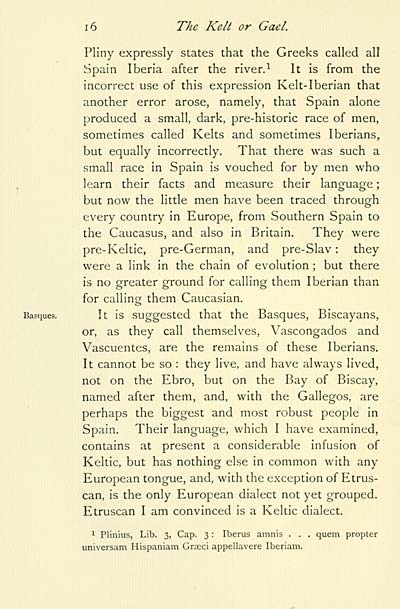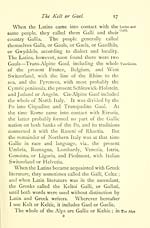Blair Collection > Kelt or Gael
(20)
Download files
Complete book:
Individual page:
Thumbnail gallery: Grid view | List view

1 6 The Kelt or Gael.
Pliny expressly states that the Greeks called all
Spain Iberia after the river.^ It is from the
incorrect use of this expression Kelt-Iberian that
another error arose, namely, that Spain alone
produced a small, dark, pre-historic race of men,
sometimes called Kelts and sometimes Iberians,
but equally incorrectly. That there was such a
small race in Spain is vouched for by men who
learn their facts and measure their language ;
but now the little men have been traced through
every country in Europe, from Southern Spain to
the Caucasus, and also in Britain. They were
pre-Keltic, pre-German, and pre-Slav : they
were a link in the chain of evolution ; but there
is no greater ground for calling them Iberian than
for calling them Caucasian.
Basques. It is Suggested that the Basques, Biscayans,
or, as they call themselves, Vascongados and
Vascuentes, are the remains of these Iberians.
It cannot be so : they live, and have always lived,
not on the Ebro, but on the Bay of Biscay,
named after them, and, with the Gallegos, are
perhaps the biggest and most robust people in
Spain. Their language, which I have examined,
contains at present a considerable infusion of
Keltic, but has nothing else in common with any
European tongue, and, with the exception of Etrus-
can, is the only European dialect not yet grouped.
Etruscan I am convinced is a Keltic dialect.
1 Plinius, Lib. 3, Cap. 3 : Iberus amnis . . . quern propter
universam Hispaniam Gr?eci appellavere Iberiani.
Pliny expressly states that the Greeks called all
Spain Iberia after the river.^ It is from the
incorrect use of this expression Kelt-Iberian that
another error arose, namely, that Spain alone
produced a small, dark, pre-historic race of men,
sometimes called Kelts and sometimes Iberians,
but equally incorrectly. That there was such a
small race in Spain is vouched for by men who
learn their facts and measure their language ;
but now the little men have been traced through
every country in Europe, from Southern Spain to
the Caucasus, and also in Britain. They were
pre-Keltic, pre-German, and pre-Slav : they
were a link in the chain of evolution ; but there
is no greater ground for calling them Iberian than
for calling them Caucasian.
Basques. It is Suggested that the Basques, Biscayans,
or, as they call themselves, Vascongados and
Vascuentes, are the remains of these Iberians.
It cannot be so : they live, and have always lived,
not on the Ebro, but on the Bay of Biscay,
named after them, and, with the Gallegos, are
perhaps the biggest and most robust people in
Spain. Their language, which I have examined,
contains at present a considerable infusion of
Keltic, but has nothing else in common with any
European tongue, and, with the exception of Etrus-
can, is the only European dialect not yet grouped.
Etruscan I am convinced is a Keltic dialect.
1 Plinius, Lib. 3, Cap. 3 : Iberus amnis . . . quern propter
universam Hispaniam Gr?eci appellavere Iberiani.
Set display mode to: Large image | Transcription
Images and transcriptions on this page, including medium image downloads, may be used under the Creative Commons Attribution 4.0 International Licence unless otherwise stated. ![]()
| Early Gaelic Book Collections > Blair Collection > Kelt or Gael > (20) |
|---|
| Permanent URL | https://digital.nls.uk/75786904 |
|---|
| Description | His ethnography, geography and philology. |
|---|---|
| Shelfmark | Blair.17 |
| Additional NLS resources: | |
| Attribution and copyright: |
|
| Description | A selection of books from a collection of more than 500 titles, mostly on religious and literary topics. Also includes some material dealing with other Celtic languages and societies. Collection created towards the end of the 19th century by Lady Evelyn Stewart Murray. |
|---|
| Description | Selected items from five 'Special and Named Printed Collections'. Includes books in Gaelic and other Celtic languages, works about the Gaels, their languages, literature, culture and history. |
|---|

